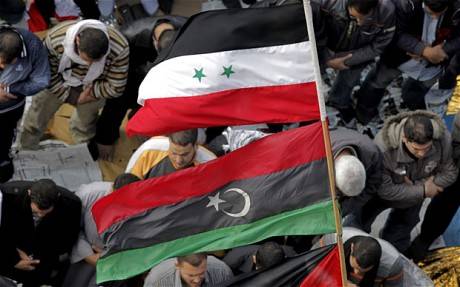Turkish President Recep Tayyip Erdogan and German Chancellor Angela Merkel held a phone conversation on Tuesday, according to Turkey's Communications Directorate.
The two leaders discussed latest developments in Libya and Syria, said a directorate statement.
On Jan. 12, Libya’s conflicting parties announced a truce in response to a joint call by the Turkish and Russian leaders. However, talks for a permanent cease-fire ended without an agreement after eastern-based warlord Khalifa Haftar left Moscow without signing the deal.
A week later, Haftar accepted terms in Berlin to designate members to a UN-proposed military commission with five members from each side to monitor the implementation of the cease-fire.
Since the ouster of late ruler Muammar Gaddafi in 2011, two seats of power have emerged in Libya: one in eastern Libya supported mainly by Egypt and the United Arab Emirates and another in Tripoli, which enjoys UN and international recognition.
Syria has been locked in a vicious civil war since early 2011, when the regime cracked down on pro-democracy protests with unexpected ferocity.
Since then, hundreds of thousands of people have been killed and more than 10 million others displaced, according to UN officials.
UK, Italy in agreement on political solution in Libya
The U.K. and Italy remained in agreement on finding a political solution to the conflict in Libya.
British Prime Minister Boris Johnson and his Italian counterpart Giuseppe Conte met in London at the launch of COP26 -- UN climate change summit, which is due in Glasgow in November.
“On regional issues, the leaders raised the situation in Iran and the conflict in Libya,” a government statement said following the meeting.
“The Prime Minister emphasised the importance of upholding the commitments made at the Berlin Conference to end the violence and support UN-led talks to find a political solution to the conflict,” it added.
The two leaders also “welcomed the broad bilateral relationship between the U.K. and Italy and agreed to continue to strengthen our alliance in a number of areas including trade, investment and security.”
A joint military commission representing Libya’s UN-recognized government and eastern Libyan forces will meet in Geneva for a second day to help turn the current truce into a "full-fledged ceasefire," said the UN’s Libya envoy Tuesday.
On Jan. 12, Libya’s conflicting parties announced a truce in response to a joint call by the Turkish and Russian leaders. However, talks for a permanent cease-fire ended without an agreement after eastern-based warlord Khalifa Haftar left Moscow without signing the deal.
Haftar agreed at the Berlin conference last month to designate members to the UN-proposed military commission with five members from each side to monitor implementation of the cease-fire.
All parties at the Berlin conference had asked Libya's Prime Minister Fayez al Sarraj and Haftar, who were in Berlin but not at the conference, "to extend the truce in order for us to give a chance for diplomacy."
The Jan. 21 Berlin agreement commits the signatories not to interfere in Libya's civil war, to support a cease-fire, to honor a widely broken UN arms embargo, and to support a UN-facilitated political process, UN’s Libya envoy Ghassan Salame said at the time of the agreement.






